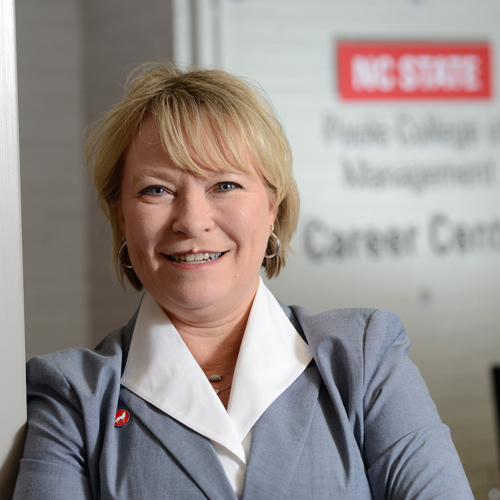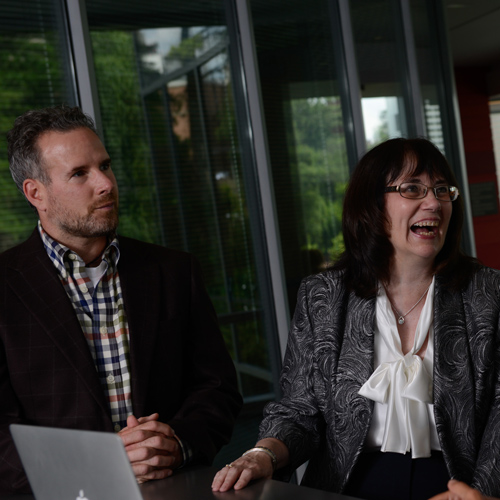
Harnessing the Power of Collaboration to Impact the Global Supply Chain
Rob Handfield does not live in an ivory tower. Instead, Handfield mobilizes his teaching expertise and academic research to address real-world business problems and bring together teams to tackle challenging issues.
Handfield, Bank of America University Distinguished Professor of Supply Chain Management at the NC State Poole College of Management, is the founder and executive director of the Supply Chain Resource Cooperative (SCRC).
“The thinking behind creating the SCRC was that it would benefit students, industry and faculty if we brought them together in a learning environment to address supply chain problems,” says Handfield. “Industry would get access to new talent, which they sorely needed; students would have a great learning experience and be able to hit the job market running; and faculty would be able to shape their research based on real-world problems faced by industry.”
50+ Industry Partners
Handfield says that supply chain problems are increasingly being addressed using analytics and quality improvement methodologies such as Lean and Six Sigma. He, his students and colleagues work with real-life data to render insights in decision-making. Twenty five to 30 student teams work on projects for industry clients each semester. Poole supply chain classes attract students from multiple disciplines across NC State’s ten colleges, such as industrial engineering, agriculture, poultry Science, textiles, industrial manufacturing and systems engineering, and forest products.
“I believe we are shaping the practices of supply chain through our student projects, and advancing and learning about it as we go,” he says. “There is true supply chain innovation going on in these classrooms!”
Impacting the Global Supply Chain
A renowned expert in supply chain management, Handfield focuses his research in three primary areas, including examining analytics and the emergence of real-time data in the supply chain. “We’re focused on the issues related to partnering and driving transparency in supply chains,” he says. His most recent book is “The LIVING Supply Chain: The Evolving Imperative of Operating in Real Time,” which he co-authored with Tom Linton, the chief supply chain officer at Flex, a multinational technology company. “We explore the nature of cultural changes, the human capability requirements and the cultural shift in mindset that is required to deal with a world in which we are connected all the time with cloud and mobile technology,” says Handfield. “We are in the very early stages of thinking how humans should interact with real-time data, while dealing with cybersecurity threats and global supply chain risks.”
Another research interest of Handfield’s is sustainability in the supply chain. “I have been working with faculty and doctoral students in NC State’s College of Textiles to look at how apparel companies source and work with third parties in low-cost countries like Bangladesh, India, China, Vietnam, Cambodia, and Myanmar,” he says. “We’re working with teams at Nike and VF Corporation (which includes brands such as Timberland and Nautica) to see how they can improve the effectiveness of their audits in factories in these countries. Doctoral students are exploring the application of new forms of data to these problems that we’ve never had before, including social media, factory costs, quality audits, news feeds, and machine-based learning.”
 Poole College supply chain undergraduate and graduate students work on interdisciplinary project teams for industry clients each semester.
Poole College supply chain undergraduate and graduate students work on interdisciplinary project teams for industry clients each semester.Measuring the Impact of the Biobased Economy
Collaboration is key to Handfield’s success in research involving the biobased economy, which refers to the production and consumption of goods produced from natural products such as corn, soybean, cotton and wood.
“A few years ago, Jay Golden, who was then a professor at Duke University and Jesse Daystar, then a PhD student in the College of Natural Resources at NC State, and I started working with the U.S. Department of Agriculture,” says Handfield. “USDA asked us to look at how you measure the impact of the growth of biobased products on the American economy.” After quickly realizing that there was no national database that captured this information, Handfield and his colleagues set about to create a way to model and measure the biobased economy.
Our research shows that the biobased economy literally impacts every state and community in the country.
The result was the 2015 publication of “Economic Impact Analysis of the U.S. Biobased Products Industry,” a report commissioned by USDA and co-authored by Handfield and Golden, (who is now vice chancellor of research, economic development and engagement at East Carolina University (ECU)). An updated version of the report was released in 2016 and an update will be released in summer 2018.
The biobased database is the first to document the indicators of the biobased economy, detailing trends in multiple sectors such as agriculture, renewable chemicals, and biobased products. “I see this database as being quite useful in understanding the underlying metrics of the biobased economy,” says Brandon Morrison, director of strategic initiatives at ECU within the Division of Research, Economic Development and Engagement, who was part of the collaboration with Handfield. “We can track things such as biobased feedstock production, job creation related to the biobased economy, and economic growth.”
According to the report, in 2014, the total contribution of the biobased products industry to the U.S. economy was $393 billion in value added and 4.2 million jobs. Every 1,000 jobs in the biobased industry supported 1,760 additional jobs in other parts of the economy. Under the USDA BioPreferred Program, which facilitates the development and expansion of markets for biobased products, the number of renewable chemicals and biobased products that are USDA-certified has rapidly increased from 1,800 in 2014 to 2,900 in 2016.
This has broad implications for the U.S. economy and particularly for North Carolina, which has the second largest rural population in the nation. “ECU and NC State are working together to develop a strong biobased products and renewable chemicals base in eastern North Carolina,” says Morrison. “Being able to partner with our neighbors at NC State—a preeminent research enterprise in and of itself—with the added benefit of having Dr. Handfield and his expertise in supply chain management is a great opportunity not only for research but I would argue for the state of North Carolina as a whole.”
 Students and faculty from five colleges across NC State, as well as East Carolina University, Duke University collaborated to create the biobased database.
Students and faculty from five colleges across NC State, as well as East Carolina University, Duke University collaborated to create the biobased database.Handfield says, “Our research shows that the biobased economy literally impacts every state and community in the country.” He believes that the database will help the biobased economy grow. “By showing an increased application of biobased materials in the economy across various sectors, additional venture capital funding for startups using these new materials will be generated,” he says. “We are seeing biobased products show up in everything from Reebok shoes, Goodyear tires, Ford trucks and Tide laundry detergent. The research is raising awareness in companies and will encourage them to explore the use of new materials, particularly in areas such as bioplastics, enzymes, cotton, forest products, and others. This will be more likely to help the biobased economy grow which will end up making this more sustainable as an economy.”
Consumers can use the database to inform personal buying decisions. “Products still need to be equivalent in terms of cost, performance and quality,” says Handfield. “But when all those things are equal, make the right choice and buy something that is biobased because you’re supporting our local economy as well as buying products that are biobased instead of petroleum-based, a more environmentally sustainable choice. A great example is buying bioplastic food containers and utensils, which are increasingly showing up at professional sports venue concession stands. Bioplastic containers are compostable, which means they can be collected efficiently as waste and won’t add to landfill. ”
“The findings and determinations of this report will be used by government decision makers to make policy that affects U.S. farmers as well as rural economies and ultimately the well-being of people,” says Daystar, chief sustainability officer and VP of sustainability of Cotton Inc. and an instructor at Duke University’s Nicholas School of the Environment. “Understanding the full implications of how biobased materials are used is important to economies, the environment and to people who are growing materials on the farms.”
Strengthening Research Through Collaboration
Creating the biobased database involved bringing together faculty from many institutions and universities, something which is uncommon in most academic settings. In addition to the Poole College of Management’s SCRC, ECU, Duke University, and Cotton, Inc., students and faculty from NC State’s College of Engineering, College of Textiles, College of Natural Resources, and College of Agriculture and Life Sciences helped realize this achievement.
“It builds a stronger research platform when you have a range of people coming together to share ideas,” says Handfield. “There needs to be more collaboration among universities and with industry. We each brought our unique skills and knowledge to produce this report.” Handfield cites Golden’s strength in life cycle analysis and Daystar’s understanding of economic modeling and environmental impact.
It builds a stronger research platform when you have a range of people coming together to share ideas,” says Handfield. “There needs to be more collaboration among universities and with industry. We each brought our unique skills and knowledge to produce this report.
“Rob brings an excellent business perspective ranging from supply chain to more economic issues,” says Daystar. “This collaboration brings strengths from a lot of different disciplines that are required to tackle the big issues of sustainability and larger issues of a more sustainable and biobased economy. Sustainability is not a one discipline kind of field; it takes a lot of perspective and experience to get at the issues and propose real solutions.”
USDA has been pleased with the biobased database which is having a global impact. “The first two reports were downloaded by researchers and scientists literally millions of times, not just within the U.S. but globally,” says Handfield. “We have received calls from places such as Germany asking us to explain our methodology. This work has impacted the growth of the biobased economy which will reduce in the long term the global footprint of petroleum-based products.”













View Comments 0